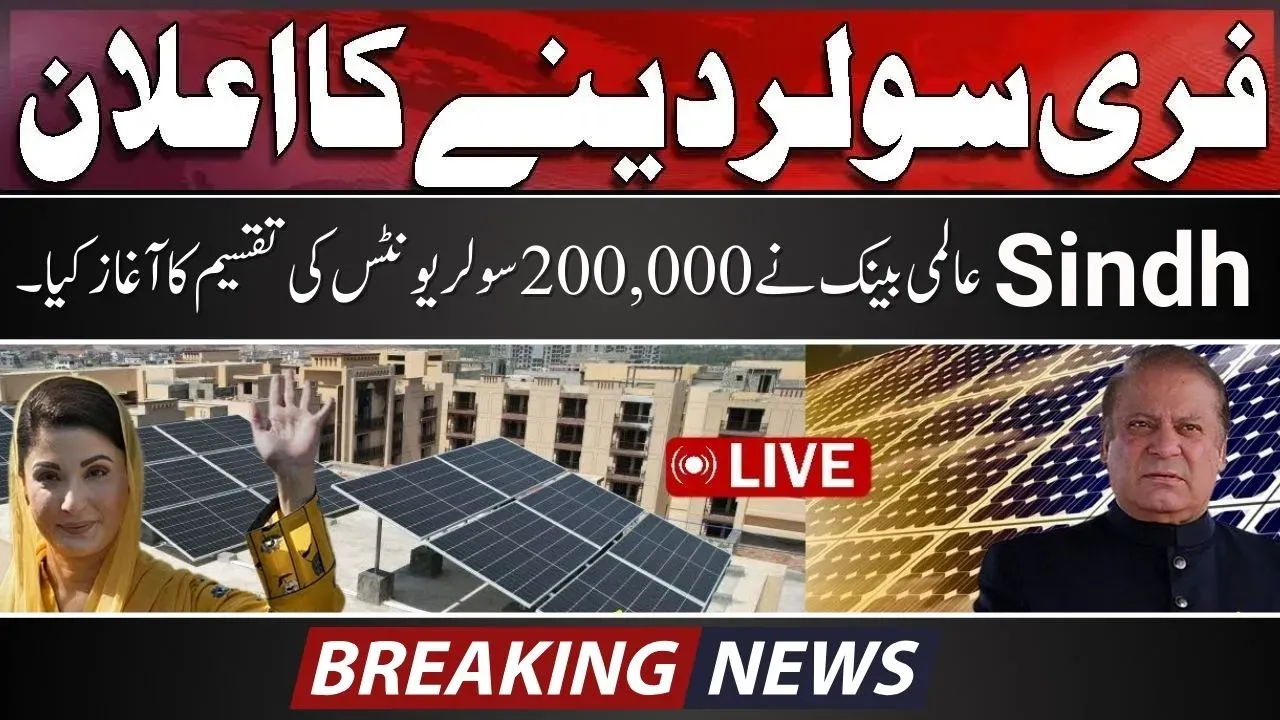The World Bank has given the green light to a significant project aimed at distributing 200,000 solar units across the Sindh province of Pakistan. This initiative is set to bring renewable energy solutions to a vast number of households, contributing to the region’s energy sustainability and reducing reliance on non-renewable energy sources. Sindh’s Energy Minister, Nasser Shah, presented the distribution plan to the World Bank team, who lauded the initiative. This project is part of a broader effort to improve energy access and infrastructure in the region.
Table of Content
The Solar Distribution Plan
The approved plan will see 200,000 solar units distributed across Sindh, a region that has been grappling with energy shortages for years. The initiative aims to provide reliable and clean energy to households that have limited access to the power grid. By utilizing solar energy, the region can reduce its dependence on fossil fuels and lower its carbon footprint. Energy Minister Nasser Shah’s briefing to the World Bank highlighted the meticulous planning involved in the project. The World Bank’s commendation reflects the project’s potential to bring substantial benefits to Sindh’s residents.

You may also read: Roshan Apni Car Scheme by ABL Recent Update 2024
| Key Points | Details |
| Solar Distribution Plan | 200,000 solar units to be distributed in Sindh for clean energy. |
| KWSIP | Karachi Water and Sewerage Service Improvement Project aims to enhance water and sewerage services. |
| Audits and Financial Oversight | Audits for 2018-2020 completed; 2021-2024 audit to be finalized by September. |
| K-IV Expansion Project | Aims to increase water supply capacity in Karachi to address water scarcity. |
Karachi Water and Sewerage Service Improvement Project (KWSIP)
In addition to the solar initiative, a briefing on the Karachi Water and Sewerage Service Improvement Project (KWSIP) was also conducted. The KWSIP is focused on enhancing the water supply and sewerage services in Karachi, a city facing significant challenges in these areas. The project aims to improve the financial health of the Karachi Water Board by introducing better management practices and upgrading infrastructure. The appointment of a new Chief Financial Officer (CFO) is a strategic move to ensure better financial oversight and accountability.
You may also read: How to get your free solar system under Punjab govt’s scheme 2024 (Step-by-Step Guide)
Audits and Financial Oversight
The Karachi Water Board has recently completed audits for the fiscal years 2018-2019 and 2019-2020. These audits are crucial for maintaining transparency and accountability within the organization. The audit for the period 2021 to 2024 is expected to be finalized by the end of September, ensuring that all financial records are up-to-date and accurate. Proper financial oversight is essential for the successful implementation of projects like the KWSIP, as it helps in identifying areas that require improvement and ensures that funds are utilized efficiently.
Documentation for K-IV Expansion Projects
As part of ongoing efforts to update the World Bank on various initiatives, documentation for the K-IV expansion projects has been shared. The K-IV project aims to enhance the water supply to Karachi, addressing the city’s long-standing water scarcity issues. The expansion of the K-IV project is expected to significantly increase the water supply capacity, benefiting millions of residents. This documentation is a critical component in securing continued support and funding from the World Bank, ensuring that the project progresses smoothly.
Importance of Renewable Energy in Sindh
- The distribution of 200,000 solar units in Sindh is a landmark step towards promoting renewable energy in the region.
- Solar energy is a sustainable and environmentally friendly alternative to traditional energy sources.
- By harnessing the power of the sun, households can reduce their energy bills and contribute to a cleaner environment.
- This initiative has the potential to create job opportunities in the renewable energy sector, boosting the local economy.
- The World Bank’s approval of this project underscores the importance of transitioning to renewable energy for a sustainable future.
Conclusion
The World Bank’s approval of the solar distribution plan and other initiatives like the KWSIP and K-IV expansion projects marks a significant milestone for Sindh. These projects are set to improve the quality of life for residents by providing reliable energy and water services. The successful implementation of these initiatives will require continuous support, effective management, and financial oversight. As Sindh moves towards a more sustainable future, these projects will play a crucial role in ensuring the well-being of its population.
You may also read: Good News: Bank of Punjab Announces Registration for Solar Panels at Various Branches
FAQs
1. What is the goal of the solar distribution plan in Sindh?
The goal is to distribute 200,000 solar units to provide reliable and clean energy to households in Sindh, reducing reliance on non-renewable energy sources.
2. What is the KWSIP?
The Karachi Water and Sewerage Service Improvement Project (KWSIP) aims to enhance the water supply and sewerage services in Karachi.
3. Why are the audits of the Karachi Water Board important?
Audits ensure transparency and accountability, helping in identifying areas for improvement and ensuring efficient use of funds.
4. What is the K-IV expansion project?
The K-IV expansion project aims to increase the water supply capacity to Karachi, addressing the city’s water scarcity issues.
5. How will the solar units benefit Sindh?
The solar units will provide clean, reliable energy, reduce energy costs for households, and promote environmental sustainability.
